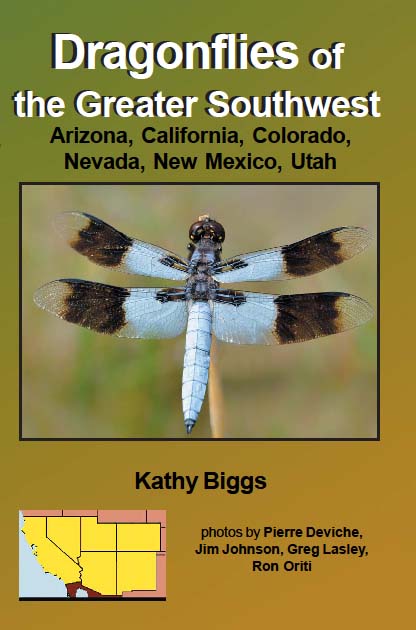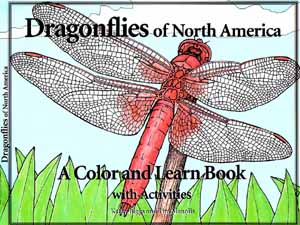Dragonflies (Odonata) of the Greater Southwest
- Arizona, California, Colorado, New Mexico, Nevada and Utah
=!= The companion website for Dragonflies of the Greater Southwest =!=



Please scroll down to find the links that interest you.
(Click here to go to my the site for the
Dragonflies of Jalisco)
View an hour long webinar originally done for the Sonoma Land Trust in 2024 on the Language of the Land: Dragonflies (English) by Kathy Biggs and Sandra von-Arb
Labeled as about in California, but actually about dragonflies in general
Scroll down to the on-line Greater Southwest on- line guide below these dragonfly educational materials
|
Updated May 2019 Dragonflies of California and the Greater Southwest, A Beginner's Guide An eGuide by Kathy Biggs 
by Kathy Biggs - Price $7.99 Buy through Amazon.com (Kindle app) (includes damselflies) |
2015 Dragonflies of the Greater Southwest Arizona, California, Colorado, New Mexico, Nevada and Utah 
by Kathy Biggs updates to species names and maps- 2017 |
SORRY - OUT OF PRINT by Kathy Biggs  see more information about the book. Published March 2004 Updates & corrections 2010 Includes damselflies |
|
Dragonflies of North America, A Color and Learn Book with Activities (also available on a CD) 
by Kathy Biggs and Tim Manolis |
July 20, 2024 Dragonflies (Anisoptera) of California - - -Also useful in all nearby states 
by Kathy Biggs & Sandra von Arb 2024 5.5" x 8.5" Click here to go to the book's Errata page |
|
|
Buy directly from us, using the links above
(all ship within 2 days and are signed by the author) Or order the book thru Amazon.com 
by clicking on the name of the book to the right that you wish to buy. |
Dragonflies of North America, Color and Learn Common Dragonflies of California Build a Pond for Wildlife Dragonflies of the Greater Southwest |
DRAGONFLIES & DAMSELFLIES
of the Greater Southwest
=!= The companion website for Dragonflies of the Greater Southwest =!=
Enter the on-line guide below.
First decide whether you want to look at Dragonflies or Damselflies,
then click on the image or the word to be taken to either the Dragonfly or the Damselfly site.
| This site is 100% privately maintained.
If you've found it helpful, a donation to help keep in on the web would be appreciated, thanks! K. Biggs |

A Facebook Western Odonata group was formed in 2013. Click on image above link to check it out!
| Sketch of a dragonfly body showing the body parts |
DRAGONFLIES - Anisoptera:Large, heavy-bodied; ordinarily larger than damselflies. Wings are held open & flat or down & forward when perched. Large eyes are spaced very close together and in most families actually touch, creating a seam down the center. Strong fliers; a few are even migratory. Males have three terminal abdominal appendages and a bump (genitalia) under their second abdominal segment. All females have only two terminal abdominal appendages and in many families they also have an ovipositor. Most dragonflies lay their eggs directly into the water. As of 2010, the southwest has at least 132 species of Anisoptera in 45 genera, representing all seven American dragonfly families. |
Sketch of a damselfly body showing the body parts |
DAMSELFLIES - ZygopteraSlender-bodied, generally smaller and more frail than dragonflies. Most have an eyespot in back of each eye. When perched, all four wings are usually held together alongside or sail- like over the abdomen. Eyes set far apart on head, appear hammer headed. Weak fliers, usually found not too far from water. Males have a bump (genitalia) under their 2nd abdominal segment and four terminal abdominal appendages. Females have a wide ovipositor on the lower end of their abdomen and only two terminal abdominal appendages. Damselflies lay their eggs directly into vegetation. As of 2016, the southwest has at least 82 damselfly species in 17 SW genera, representing all 4 American families. Note that the family Protoneuridae is gone; it has been lumped into the Coenagrionidae. http://www.odonatacentral.org/docs/NA_Odonata_Checklist.pdf |
Click here to see the life cycle of a dragonfly in a photo story with text!
Click on a map or text below to be taken to a website that features only the dragonflies of that particular state.
There is also a Western Odonata Facebook page that covers all these states and several more
|
and CalOdes discussion group |
 |

|
 |
and an Arizona Facebook group |
|
I'm glad you enjoy the dragonflies and damselflies too! THANK-YOU for visiting!!
Kathy Biggs, Azalea Creek Publishing
Hosted By  -- They are a great company and have a wonderful referral program. Click on their name to find out more about them.
-- They are a great company and have a wonderful referral program. Click on their name to find out more about them.
